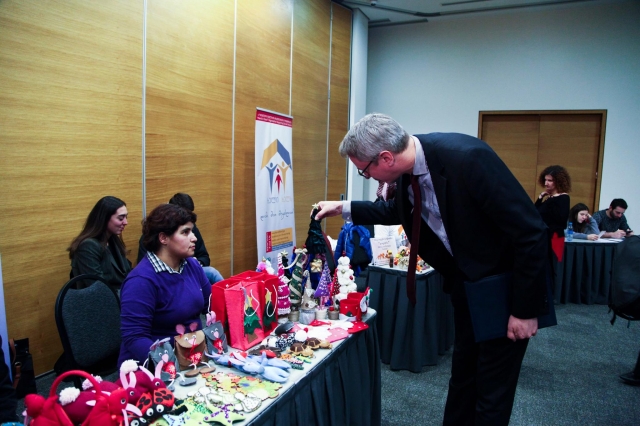Social Change Campaign for Reduction of Stigma against Disability in Georgia
The nationwide communication for social change campaign, #SeeEveryColour, has addressed wide-spread misconceptions and false beliefs around people with disabilities in Georgia. The campaign also reached more than one million people and contributed to a reduction of stigma against people with disabilities – a major outcome for the campaign which summarized its results at a special event in Tbilisi. The two-year campaign was carried out by UNICEF and supported by USAID and the European Union. Children with disabilities and their parents were also actively engaged.
“We are proud that Georgia has managed to reduce negative perceptions and attitudes towards children and young people with disabilities by more than 13 per cent”, said Ghassan Khalil, UNICEF Representative in Georgia. “Children and young people with disabilities have more opportunities now to develop and enjoy their rights. As a result of the campaign, we have created a core group of change makers who will further work to build more inclusive societies. We will continue to support the Government to enable them to lead the process of social change and will work with various professional groups to further overcome stigma against disability”, added UNICEF Representative.
The ‘See Every Colour’ campaign, delivered over a two-year period, involved a mix of interventions. These included: educating the population about disabilities and deconstructing current myths and prejudices; illustrating how to model the right attitudes and promoting interaction between young people with and without disabilities; empowering children with disabilities and their parents by giving them a platform for advocacy; and initiating policy and community discussions, and strengthening local government mechanisms and community networks.
Since February 2017, as part of the campaign, extensive outreach activities throughout Georgia were undertaken, including interpersonal meetings, media campaigns, and large-scale national and regional events, as well as cooperation with professionals – such as doctors and teachers – to improve the way they work with parents of children with disabilities.
Students in schools and universities learned about the needs of people with disabilities through debates and discussions. A video series called ‘Peer Journeys’ was produced, pairing young people with and without disabilities going through everyday situations and reflecting on their own experiences. The stories featured how attitudes and beliefs could be changed through communication and friendship.
A brochure ‘Myth and Realities’ deconstructing current myths and prejudices on disability, and comics to illustrate positive attitudes towards children with disabilities were produced and widely distributed. This material was used to support interactive discussions and quizzes.
A competition among municipalities identified 10 municipalities which shared their best practices in creating an inclusive and supportive environment for people with disabilities. These municipalities serve as role models for other towns and villages in the country.
The online campaign ‘Parents for Change’ invited parents of children with disabilities to share their stories, which were also widely shared through social media. Online quizzes checked peoples’ knowledge about disabilities and cinemas held offline events, screening videos demonstrating the abilities of people with disabilities before films.
As a result, the #SeeEveryColour campaign in Georgia has contributed to a reduction of stigma against disability from 41.5 per cent in 2015 to 28.3 per cent in 2017.
Image source: UNICEF Georgia












